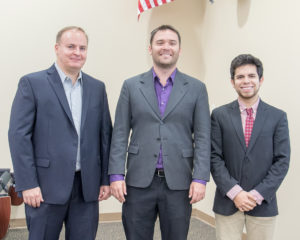Lasera
Laser Etching to Create Permanent Nano-Structure on Almost Any Surface.
Common waterproofing practices involve using rubber or silica based polymer coatings to protect a product’s outer surface. The problem with superficial coatings is that they corrode and become ineffective over time. UCF I-Corps team Lasera has devised a process to create permanent surface microstructures for metals, ceramics, and plastics. These microstructures can be used to make a surface anti-microbial, hydrophobic, self-cleaning, resistant almost any external substance, and even bio-compatible.
Lasera’s innovative approach to waterproofing, and surface restructuring in general, would ultimately put an end to ineffective product coatings. And they can do it 20 times faster than other advanced laser processers. With these advantages in mind, Lasera joined the UCF I-Corps program to simplify their market entry strategy and identify ideal customer segments.
The customer discovery process resulted Lasera identifying the bio-medical industry as the customer segment with the most market potential. Lasera’s products are ideal for clean rooms, lab testing equipment, and medical implants, which proves to be an excellent market fit. Thanks to the UCF I-Corps process, Lasera was able to thoroughly define their market segment and develop an effective plan for market entry.
Lasera’s team consisted of Hunter Williams as the Entrepreneurial Lead, with a background in Aerospace Engineering, working for NASA with a focus in emerging technologies; the Primary Investigator was Ilya Mingareev Ph. D., who has 10 years of experience with laser technology and is a faculty member with UCF’s Laser Materials Processing department; Daniel Nichols, an electrical engineering student at UCF, acted as a vital team member during the Lasera I-Corps customer discovery phase. And Ron Tetenbaum of RRT Capital served as the team mentor through the UCF I-Corps process.



